Copyright 2016 by Princeton University Press
Published by Princeton University Press,
41 William Street, Princeton, New Jersey 08540
In the United Kingdom: Princeton University Press,
6 Oxford Street, Woodstock, Oxfordshire OX20 1TW
press.princeton.edu
Jacket Image: Sisyphus Peter Kavelin / Thinkstock
All Rights Reserved
Library of Congress Cataloging-in-Publication Data
Names: Kertzer, Joshua D., 1984 author.
Title: Resolve in international politics / Joshua D. Kertzer.
Description: Princeton, New Jersey: Princeton University Press, 2016. |
Series: Princeton studies in political behavior | Includes bibliographical references and index.
Identifiers: LCCN 2016012451 | ISBN 9780691171609 (hardback: acid-free paper)
Subjects: LCSH: International relationsPsychological aspects. | Political psychology. | EconomicsPsychological aspects. | WarDecision makingPsychological aspects. | BISAC: POLITICAL SCIENCE / International Relations / Diplomacy. | POLITICAL SCIENCE / International Relations / General. | SOCIAL SCIENCE / General.
Classification: LCC JZ1253 .K47 2016 | DDC 327.101/9dc23 LC record available at https://lccn.loc.gov/2016012451
British Library Cataloging-in-Publication Data is available
This book has been composed in Minion Pro and ITC Franklin Gothic Std
Printed on acid-free paper.
Printed in the United States of America
Typeset by Nova Techset Pvt Ltd, Bangalore, India
1 3 5 7 9 10 8 6 4 2
ACKNOWLEDGMENTS
If the aphorism is true, and all books are autobiographical, I have a number of issues with resolve.
When they began is an open question, but the book itself began as a dissertation written at the Ohio State University under the tutelage of Rick Herrmann, Bear Braumoeller, Kathleen McGraw, and Chris Gelpi, who were more generous with their time and more thoughtful in their feedback than they had any need to be, and who patiently let me pursue a riskier project than I had any right to pursue. Most of the books redeeming qualities were likely incepted from them.
I also appropriated liberally from the remarkably helpful and constructive comments I received presenting parts of the project to audiences at Binghamton University, Dartmouth College, Harvard University, McGill University, New York University, Ohio State, Princeton University, UCLA, UC San Diego, UC Santa Barbara, the University of Illinois at Urbana-Champaign, the University of Kansas, the University of North Carolina, the University of South Carolina, the University of Southern California, Yale University, and the annual meetings of the International Studies Association and the Peace Science Society. To this end, Im grateful to too many people to name, including Bentley Allan, Scott Althaus, Burcu Bayram, Adam Berinsky, Daniel Bessner, Bill Boettcher, Jake Bowers, Jan Box-Steffensmeier, Steve Brooks, Zoltan Buzas, Austin Carson, David Carter, Dave Clark, Giacomo Chiozza, Mike Colaresi, Allan Dafoe, Alex Debs, Peter Feaver, Ben Fordham, Jeff Friedman, Stephen Gent, Emilie Hafner-Burton, Steph Haggard, Marcus Holmes, Ted Hopf, Mike Horowitz, Susan Hyde, Ben Jones, Luke Keele, Katja Kleinberg, Andy Kydd, David Lake, Debbie Larson, Brad LeVeck, Jason Lyall, Sebastien Mainville, Eleonora Mattiacci, Rose McDermott, Jennifer Mitzen, Nuno Monteiro, Neil Narang, Irfan Nooruddin, Barry ONeil, Krzysztof Pelc, Maggie Peters, Paul Poast, Vincent Pouliot, Bob Powell, Katy Powers, Mike Poznansky, Brian Rathbun, Jonathan Renshon, Elizabeth Saunders, Randy Schweller, Patrick Shea, Harvey Starr, Janice Stein, Tricia Sullivan, Phil Tetlock, Alex Thompson, Rob Trager, Mike Tomz, Chris Twomey, David Victor, Srdjan Vucetic, Alex Wendt, Jessica Weiss, Bill Wohlforth, and Keren Yarhi-Milo.
The survey experiment in and the anonymous reviewers for their help in improving the experiments instrumentation, and to Ben DiPaola and Poom Nukulkij at GfK for their assistance fielding the study. The project was also supported in part by a doctoral fellowship from the Social Sciences and Humanities Research Council of Canada, a dissertation-year fellowship from the Graduate School at Ohio State, and a wonderful year as a fellow at the Dickey Center for International Understanding at Dartmouth College under the intrepid leadership of Dan Benjamin.
The book was completed at Harvard, where I found a vibrant intellectual community in the Government Department, under the skilled stewardship of Tim Colton. Im particularly indebted to Jeff Frieden, Iain Johnston, Steve Rosen, Beth Simmons, and Dustin Tingley for all of their guidance with the project, as well as all of the colleagues, faculty, and graduate students who sharpened my thinking along the way. Im also beholden to Steve Bloomfield and Tom Murphy for giving me a home in the Weatherhead Center, and to Frankie Hoff, who knew the answer to every question I asked. An Undergraduate Research Scholars award from the Institute for Quantitative Social Science helped broaden the books audience, and Im grateful to Alice Hu, Aaron Miller, and Nathan Williams for their helpful research assistance.
At Princeton University Press, Eric Crahan was willing to gamble on a manuscript probably more conceptual than most quantitative books, and probably more quantitative than most conceptual books; I am thus thankful for his risk preferences, as I am for Tali Mendelbergs time horizons, and for the improbably helpful comments procured from three anonymous reviewers.
Finally, for raising my costs of backing down, my deepest thanks to Adrienne, Jonathan, and Nicholas Kertzer, Nick White, Ryan Brutger, Amy Catalinac, George Ibrahim, Eleonora Mattiacci, Brian Rathbun, Jonathan Renshon, Elizabeth Saunders, Keren Yarhi-Milo, and Thomas Zeitzoff, all of whom cathected the project in different ways, and whose support and encouragement made it possible. The book is dedicated to Sam and Miriam Kertzer, and Olga and George Haas, who knew much more about resolve than I do.
RESOLVE IN INTERNATIONAL POLITICS
CHAPTER 1.
Resolve in International Politics
Desire, wish, will, are states of mind which everyone knows, and which no definition can make plainer.
William James (1950 [1890], p. 486)
On January 12, 2010, an earthquake struck the island nation of Haiti, reducing much of the capital city of Port-au-Prince to rubble. In the days afterward, as the casualty estimates grew by the hundreds of thousands and the international community turned its attention toward rebuilding the ravaged country, pundits pontificated on the uphill battle faced by a country that had suffered as many man-made disasters as natural ones. Bob Herbert, writing in the New York Times, struck an optimistic note: the Haitians would succeed, he argued, because they had shown resolve among the ruins.
Herbert is not alone in positing resolve and its synonymswillpower, self-control, dedication, tenacity, determination, drive, and so onas a solution to political problems. The collapse of the Mubarak regime in Egypt has frequently been attributed to the resolve of the protesters in Tahrir Square (their determination is unshakeable, noted the editor of the


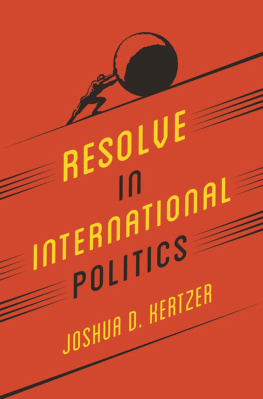
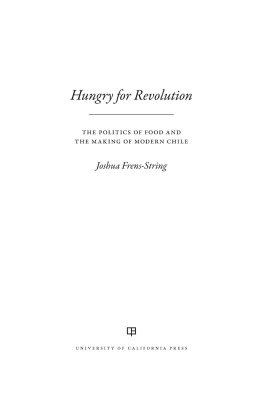
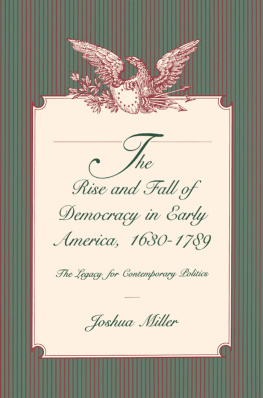
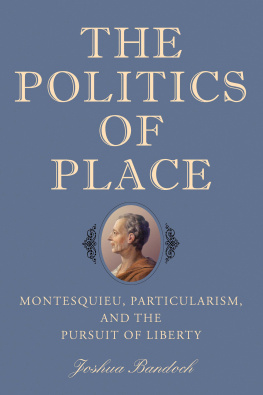
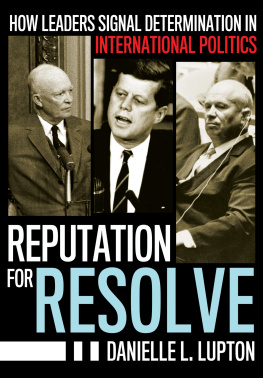

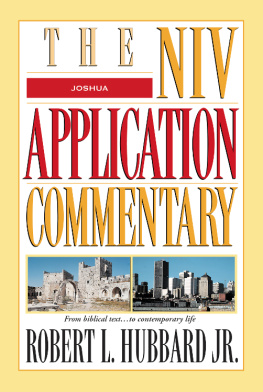

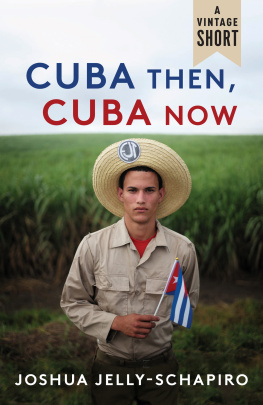

![Joshua Backfield [Joshua Backfield] - Becoming Functional](/uploads/posts/book/120483/thumbs/joshua-backfield-joshua-backfield-becoming.jpg)